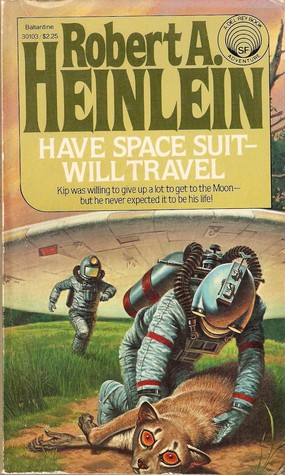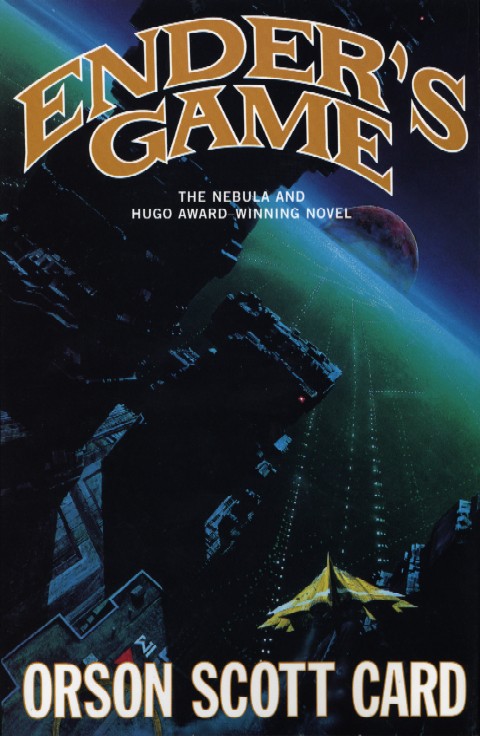
How can any kid not like a book that teaches you school is worthless?
One of the more striking aspects of how science fiction has changed over time is the lack of works that appeal to younger fans. Think back, dear reader, to the first books and authors in the genre that really grabbed your attention. In my case, it was Heinlein. Not only his famous series of juveniles (Have Spacesuit-Will Travel was a particular favorite) but other adventures such as Starship Troopers and The Puppet Masters. Of course, all those came out in the 50s. And with a few exceptions, the first loves of any reader will have been published many decades ago, too.
In the early years, there was no shortage of science fiction for a youth to become entranced by. HP Lovecraft, Burrough’s Barsoom series, and a bit later, someone like Doc Savage offered thrilling, exciting, and imaginative stories that could be enjoyed by all ages. Indeed, a great science fiction author who grew up in that period, Philip Jose Farmer, directly cites it as inspiration for his own work.
The 50s weren’t bad, either. In addition to Heinlein, there was a Clifford Simak or a Jack Vance. But start getting into the 60s and 70s, and it gets murky. Think of the famous works of that era and it becomes tougher to come up with anything that isn’t strictly for adults. Yeah, I love Dune or the writings of Philip K Dick, but they weren’t for kids.
Needless to say, the relative lack of such books in more recent times is a contributing factor to science fiction’s decline in popularity as a genre. Most people develop tastes and habits earlier on in life, and if they never found any interesting science fiction books as children, why should they bother with it as adults? Most won’t even give it a shot! Now, the great works from the 50s and earlier might tide over those that grew up in the 60s and 70s, but eventually, the lack of such fiction will take a toll.
Some may argue that this is proof of how mature and complex the genre has become. To this, I would first point out the difficulty of writing a good adventure story that appeals to youth. It’s something a literary critic might thumb his nose at, but it’s damn hard work! If it was so easy, everyone would be a children’s author with multiple mansions and a portion of Universal Studios devoted to their series.
Secondly, I don’t know that science fiction as a whole has necessarily advanced as a genre. Indeed, read many of the recent Hugo winners, and one will come to the logical conclusion that it has regressed.
It’s interesting to look at the few exceptions in recent times. Sterling Lanier’s Hiero’s Journey was written in 1973 and is one of those old-school adventures that can be perfectly appreciated by any adolescent, even if sex comes up considerably more than it would in Simak’s idyllic settings of 1950’s rural America. And look how successful and influential it was!
Jeffro has done a fine job describing its influence on the popular RPG series Gamma World, and of course, it’s part of Appendix N, too. From a personal perspective, the book was very popular in my native Russia, and I noted in my review of the sequel The Unforsaken Hiero, a later, unofficial sequel was published in that country. Not bad, eh?

Despite Card’s fine writing, it’s clear young readers of earlier generations had much cooler covers to look at!
And yet, it still pales before the success of 1985’s Ender’s Game. I remember talking to my fellow incoming freshmen at Caltech, and over half of them, myself included, read and loved the book growing up. That’s remarkable, given that most of the class hardly ever read for pleasure! And yet, that’s how fantastic of a job it did of capturing the feelings of being a misunderstood, picked on, weird kid, among other stellar qualities. And how many adolescents can’t relate to such feelings, especially when told within a story of personal growth, heroism, and toughness?
(On an amusing note, having once read Orson Scott Card’s website frequently, he is very much a man who loves the wholesomeness and values of 1950’s America. I wouldn’t be surprised if the book was at least in part an attempt to write a newer type of Heinlein juvenile)
So why isn’t there more science fiction that includes young people as an audience, given its potential for success? Part of it is the difficulty of the task. Part of it is the pretensions of the author; they see works accessible to youth as beneath them. And part of it is how much easier it is to write fantasy for young people as opposed to science fiction. One need not know any science as an author, and there is less chance of confusing the more dull-witted of one’s readers if the explanation for everything is magic!
And yet, despite all of that, there is still an opportunity here. Even nowadays.
Starship Troopers was a juvenile.
The Puppet Masters kind of toed the line.
I think we were slightly luckier in the UK, with Dan Dare, Pilot of the Future appearing weekly in the Eagle into the late ’60s (and in a number of revivals since), and a stable of British authors like Hugh Walters, E.C.Eliot and even Capt. W.E. Johns, whose books were to be found in most libraries. And in Walters’ case, continuing to produce new books through the ’70s as well.
The years around 1960 had a mood of optimism for the future — “the white heat of the technological revolution” and all that — which had gone by the end of the 1970s. We’d been to the Moon — and then stopped. SF in the round seemed to have contracted to either eco-disaster or thinly veiled Vietnam fix-fics (into which latter camp the original Ender’s Game short fitted). No wonder people stopped feeding the now poisoned material to children.
Vlad
A thoughtful reflection. I agree that many contemporary writers totally misunderstand writing to kids. It’s not beneth them; in fact a good writer doesn’t talk down tobthe kids but to adapt 5he stories for their understanding.
Kids know courage cowardice fear and friendship etc. So it’s a question to it appropriately. And thaat’s tge problem contemporsry writrrs wsnt to ‘authentic’ and want to be explicit as a result. Strikes both as bad manners and a disdsin for the youthful readers. Writer have as much of a duty to protect a kids’ innonence as they explore the grest conversation.
xavier
The ‘problem’ is that SF concepts have got too big and popular for the genre. The most interesting YA science fiction is being marketed by non-genre imprints, not that it doesn’t exist.
There is a lot of ‘sci-fi’ for kids but it’s in the teenage section of my local library, not in the science fiction/fantasy section. A lot is in related fields, like those Alex Cross teenage spy books. There’s a lot of steampunk stuff, whose titles I can’t remember. Do a search on ‘steampunk young adult’ and you’ll see page after page. There’s a lot of sf/fantasy crossover stuff for kids, such as Artemis Fowl, and then outright fantasy books like Philip Pullman’s stuff.
There are a lot of books for kids with science-fictional _trappings_, but not a lot of actual science fiction. The science depicted is comic-book science, or possibly the “tabloid science” of the UFO/paranormal fringe. The tone is arch and ironic — “isn’t this old sciencey stuff quaint and amusing?” — rather than the earnest paeans to competence that Heinlein or even Bert Brinley’s “Mad Scientist’s Club” stories. (Both authors were regular contributors to _Boy’s Life_, by the way.)
Andre Norton was my gateway drug to sff. Most of her protagonists were in the teens to young adult range, and they had fantastic adventures on equally fantastic worlds.
https://www.amazon.com/Andre-Norton/e/B000APZD0M/ref=sr_tc_2_0?qid=1507663502&sr=1-2-ent